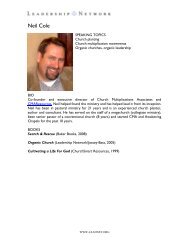ARE WE A PEOPLE AT HALF TIME? - Leadership Network
ARE WE A PEOPLE AT HALF TIME? - Leadership Network
ARE WE A PEOPLE AT HALF TIME? - Leadership Network
Create successful ePaper yourself
Turn your PDF publications into a flip-book with our unique Google optimized e-Paper software.
They evaluate their leadership by its positive<br />
impact on helping people's lives be<br />
transformed by Jesus. No leader who serves<br />
followers has ever wanted for lack of them.<br />
No one would argue that inauthentic<br />
leadership was ever acceptable. However,<br />
the stakes have never been higher for leaders<br />
to evidence authenticity. <strong>Leadership</strong> has<br />
shifted from positional to personal, from<br />
role to responsibility, from commanding to<br />
covenanting. <strong>Leadership</strong> is increasingly<br />
exposed rather than insulated. The distance<br />
between the front lines and the bottom lines<br />
is narrowing. All this means that some<br />
significant things hinge on the promise and<br />
presence of authentic leadership.<br />
Spiritual vitality begins with authenticity.<br />
Spiritual formation is the number one issue<br />
for Christian leaders. This is not to discount<br />
the need for leaders to be competent.<br />
However, we must see a lack of personal,<br />
spiritual vitality as a competency issue. A<br />
growing number of church leaders (lay and<br />
clergy alike) grow dissatisfied with serving<br />
as mechanics on church machinery. They<br />
yearn for deeper meaning and a sense of<br />
significance in the pursuit of their call.<br />
Spiritual authenticity shows up in the<br />
leader’s being open and vulnerable. The<br />
imprimatur of authenticity extends to the<br />
development of grace-based relationships<br />
with others that grows out of seeing others<br />
with Jesus' eyes. Authentic leaders don't<br />
pretend with God or with others. They<br />
don't hide their weaknesses. Nor do they<br />
ignore them. These challenges serve as the<br />
green edge of the leader's personal growth.<br />
Authentic leaders are ones who still struggle<br />
to grow and invite others to do the same.<br />
Authenticity promotes accountability, with<br />
the leader going first. Genuine spiritual<br />
leaders leave others encouraged, refreshed<br />
and hopeful. Their authenticity allows<br />
them to bless others. They reflect the heart<br />
of God to their followers.<br />
Community-building rests on the<br />
foundation of authenticity. Jesus established<br />
the Church as a faith community. The Spirit<br />
descended at Pentecost on members of a<br />
praying community in the Upper Room,<br />
many of whom had spent three years in<br />
Jesus' personal group of disciples. Jesus chose<br />
community as his leadership development<br />
model because He was used to community<br />
where He came from. He chose to do His<br />
work on earth as He had in heaven — in<br />
community with the Father and the Spirit.<br />
The early Church maintained this sense of<br />
community. Life transformation still occurs<br />
best in community. This is why<br />
congregations that take life transformation<br />
seriously look for ways to create intentional<br />
community, usually in some kind of small<br />
group expression.<br />
Genuine authenticity cannot thrive absent<br />
authenticity. Dysfunctional community can.<br />
Noncommunity can. Bureaucracy can.<br />
Programs can. Clubs can. But communities<br />
of faith require covenant and accountability<br />
and a priority on relationships. Lifetransforming<br />
congregations provide healthy<br />
environments where people can be real with<br />
each other and real with God. Being broken<br />
is the entry requirement to the community,<br />
not having it all together. Without leaders<br />
who traffic in honesty and grace,<br />
community breaks down. People then<br />
pretend and power up. They judge and<br />
exclude. When leaders practice candor,<br />
when they admit they do not have all the<br />
answers, when they acknowledge they have<br />
shortcomings, when they celebrate others'<br />
accomplishments and when they coach with<br />
grace, they foster community.<br />
Team-based leadership requires<br />
authenticity. Teams use trust as currency.<br />
If it is in short supply, then the team is poor.<br />
If trust abounds, the members of the team<br />
have purchase power with each other to<br />
access each other's gifts, talents, energy,<br />
creativity and love. The development of<br />
trust, then, becomes a significant leadership<br />
strategy. Trust creates the load limits on the<br />
relationship bridges among team members.<br />
Trust grows only to the extent that<br />
authenticity is present. This means that<br />
leaders cannot be isolated and insulated.<br />
Authentic leaders risk. They trust their<br />
followers just as they want to be trusted by<br />
them. They give freedom for failure but<br />
ensure that learning practices are in place<br />
to coach for life and ministry effectiveness.<br />
Authenticity supports better decisionmaking<br />
because options can be debated.<br />
Pre-Christians search for authenticity.<br />
A final argument for authentic leadership<br />
comes back to the leader’s passion to partner<br />
with God in His redemptive mission in the<br />
world. In an experience-based postmodern<br />
culture, leaders can no longer count on the<br />
authority of the Bible to challenge<br />
peoples' lives. What counts today is what<br />
counted in the first century before the New<br />
Testament had even been written…the<br />
power of an authentic life. This is why Jesus<br />
is still held in high esteem today, even while<br />
the institutionalized expression of the faith<br />
He founded is suspect to many, particularly<br />
those whose view of Christianity is limited<br />
to its un-grace-ful expressions.<br />
Those outside the Church culture flee<br />
institutions or religious clubs that exist to<br />
serve themselves. They are not interested<br />
or impressed with the size of church<br />
buildings or membership rolls. They are not<br />
looking for religious activity; they are<br />
looking for spiritual authenticity. They are<br />
desperate for God. Any Christian leader<br />
who takes seriously the Great Commission<br />
seeks for ways to reduce the barriers between<br />
people and God. This passion for people<br />
will drive the leader to authenticity. A love<br />
for the people Jesus died for will lead leaders<br />
to create authentic expressions of Jesus' love<br />
by helping people, not condemning them,<br />
by creating hope, not generating shame. In<br />
short, authentic spiritual leaders have a shot<br />
at people outside the faith because they will<br />
follow Jesus into the streets and meet people<br />
on the turf of their own life concerns.<br />
Practicing authentic leadership will demand<br />
two things from you. First, it will require<br />
choices. Not just one choice, but thousands.<br />
Every encounter with God, with other<br />
people, with yourself will create a choice of<br />
whether you will be authentic or something<br />
less. Second, authenticity will require<br />
courage. The courage to face your own self,<br />
to risk vulnerability with others, to place<br />
your life completely in God's hands. It<br />
requires the courage to disappoint others,<br />
but to please the One who desires to make<br />
you into an authentic masterpiece —<br />
a whole person.<br />
Reggie McNeal is the<br />
Director of <strong>Leadership</strong><br />
Development for the<br />
South Carolina Baptist<br />
Convention. 800-765-0030<br />
reggiemcneal@world.att.net<br />
www.leadnet.org<br />
4







